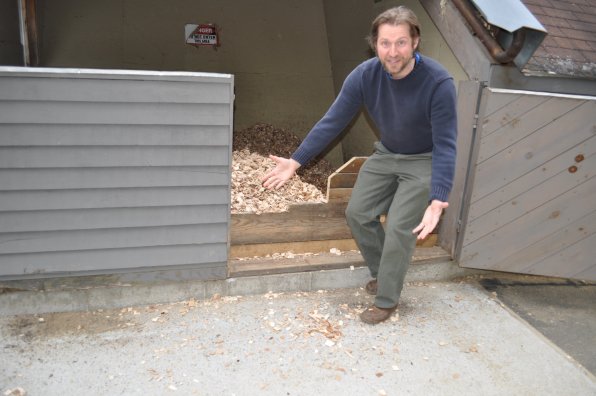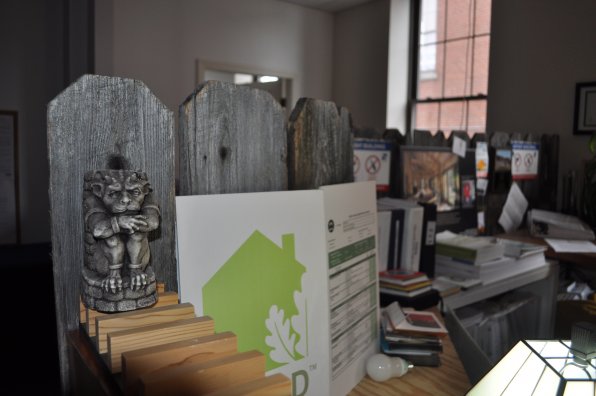You don’t even have to set foot inside the Society for the Protection of New Hampshire Forests building on Portsmouth Street to come face to face with the organization’s approach to efficiency and environmental awareness.
There’s a bike rack hanging on the exterior wall of one building wing, and even though the day we visited featured measurable snow in April (we’re collecting money to relocate everyone in Concord to Key West, if you want to donate), there were still two cycles proudly displayed as evidence of green commutes.
It’s all part of what Jason Teaster, the Conservation Center’s property manager, calls “walking the walk.” Or in this case, riding the ride.
“What can we do to be a leader?” Teaster asked in describing the Society’s approach. “Wise use of natural resources, that’s kind of the core mission of the Forest Society. We want to continue to do a good job and strive to do better. We want to lead; we want to show people that it can be done, and in an economical way.”
That show-and-tell truly begins once you’re inside the Forest Society headquarters, where you’ll find composting toilets, recycling water systems that provide nourishment to interior and exterior plant life and original architectural plans so advanced that the 1980 blueprint called for a roof pitched to a specific angle with the goal of adding solar panels (which have since been installed, in 1998).
The Forest Society is hardly the only green game in town, though. Over at the Jordan Institute and Resilient Buildings Group on Dixon Avenue, staffers are evaluating buildings for efficiency shortcomings, designing effective and affordable solutions and guiding the construction process through to completion.
“These are not glamorous buildings; they’re places people work,” said Laura Richardson, executive director of the Jordan Institute. “It’s so hard to be able to predict what energy costs are going to be – it’s dynamic, it’s volatile. But the one thing you can do is improve your building.”
So what does that mean to you? Well, if you worked at Nobis Engineering on Chenell Drive, it would mean you were no longer freezing cold at your desk one minute and overheating the next. RBG did an energy audit at Nobis and found significant shortcomings in the efficiency department.
So the group installed a robust air barrier and improved insulation, added a gas-fired heating system and updated all lighting to LED. The result so far this year, according to RBG General Manager Dana Nute is a better than 50 percent decrease in gas usage.
“I noticed for myself, this winter, despite it being so cold, my feet didn’t feel that radiating cold nearly to the extent I would have before we did (the work),” said Ken Koornneef, president of Nobis. “Another big indicator for us is we usually have pretty substantial ice dams – like, massive ice dams – and on our south side we had virtually no icicles at all (this year).”
So yeah, there’s a lot of pretty cool efficiency stuff going on right here in Concord. The entire Forest Society building is a testament to the approach, complete with passive solar design in the original wing that was pretty advanced for 1980, featuring water tubes that collect sunlight and release heat when the sun goes down to decrease the office’s reliance on the heating system.
Which, by the way, is entirely fueled by wood chips (save for a boiler used only in power outages and other such situations). Teaster said the society uses about 100 tons of wood chips per year, all purchased from Henniker Hard Palate in Henniker, which sources its wood locally from Merrimack and Hillsborough Counties.
The French Wing is home to the aforementioned water system that uses greywater from showers and sinks to water plants in the wing and flower beds outside, meaning the society gets three uses out of every gallon of water. The wing was constructed using some beams made out of trees cut down on site and was the first LEED Gold Certified building in New England.
And the Forest Society, like Jordan and RBG, wants to make everyone aware that being efficient doesn’t have to be difficult, or cost a fortune. The elements in its building or similar approaches are possible to replicate in your own home.
“We’re trying to get people to think about their homes the way they think about their cars. So an energy auditor is like a mechanic for your home; he’ll diagnose what’s going on under the hood, or in the attic,” Teaster said.
The Forest Society and Jordan/RBG aren’t the only ones setting the tone, either. The Audubon’s McLane Center has a ton of cool efficiency features, and Weston Solutions features a green roof, with actual vegetation growing up there (see more on both on pages 20 and 21).
So yeah, Concord is doing a pretty good job of staying up on the whole efficiency thing. So if you’re tired of feeling that icy draft on the back of your neck when you’re sitting down to dinner, first make sure your little brother isn’t being a jerk and just blowing cold air at you, and then do some research and check with one of these local groups for advice and a plan.
It may cost a little bit now, but it’ll save you a ton in the long run.
“We show (people) what the payback is,” Nute said or RBG. “People say, ‘in five years I’m putting money in my pocket.’ We tell it like it is.”
But nobody tells you what to do. You can do what you like with the recommendations and improve what you want to improve.
“It never works if it’s round peg, square hole,” Richardson said. “If it’s a new peg, we try to communicate with everybody.”










